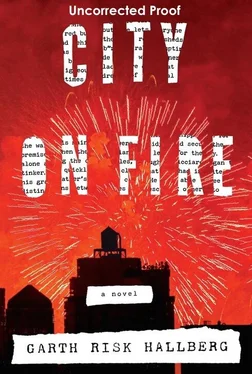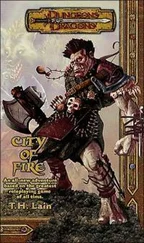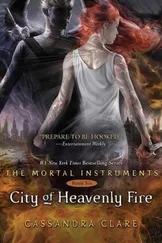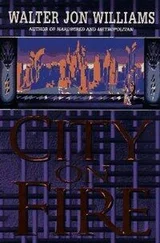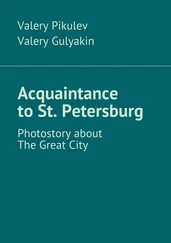Then there’s a commotion out in the stairwell. Probably some straggling Angel. There were several of them passed out on the landings when he came in, and you could just tell from the liquid squelch beneath the feet and the spiritual reek of their snores that there had been many, many more here in the course of the night, doing what Angels do. But when something starts to rattle the lock on the far side of the pebble-glass, he is suddenly afraid. Light from the skylight frames a huge-headed man. He realizes just as the door swings open that the head is hair — that the man is Mercer — and has only a microsecond to make himself seem normal. And what could be more normal, in New York City, than a person with a camera to his eye? The little focal circle floats over cracked eyeglasses. A black eye. A beard. A split lip. It’s like William’s got the lens backward somehow; he should be the one standing there, beheld and wondered at. Not that he can say this. “Well, it looks like someone had a night to remember.”
There is an impossible pause. Then, as if William isn’t even there, Mercer lumbers toward the window to greet Eartha. Through the viewfinder, the room with all its shadows seems too large to cross, but William is up and crossing it. He can smell Mercer’s sweat, and the spice of … is that pot? He reaches for a shoulder, trying not to feel excited. “No, really. What happened, Merce?”
Mercer slips out of range of the hand. “You have no right to be here.”
“But I wanted to see you,” William says, which has the virtue of being true. This would be easier if they could see each other’s faces. Easier or harder — one or the other.
“Oh, for once, William, can we please drop the pretense that you have any idea what you want? You go purely on impulse, is what you do. And as soon as you get an impulse to run back out of here, you’ll leave again.” Mercer keeps shifting to the left and the right, trying to get to the door. Finally, he slips free. “I’m going out again. When I come back, I want you gone.”
He slams the door so hard it seems the glass might break. But the feet in the stairwell, instead of descending, head up to the roof. And William is left standing here like an idiot. There is water, somehow, between the windowpanes. It has beaded up in one corner and elsewhere left ghostly tiger-stripes on the glass. Beyond it, Mercer’s cinderblock planter is a graveyard. The sky is the dark purple-gray of a bruise. Again, the idea threatens to come. Something about showing versus saying. But how to gesture at the thing doing the gesturing? Coffee — is that the idea?
Five minutes later, the damp stairs are again squelching beneath his Chucks. The door at the top is half-open, the bottles massed on the uppermost step burning with the imminence of morning. This used to be where he came to savor his isolation. Like all large canvases, his city required that: a place far enough away to step back and view it. He would run into Bullet up here, might even plunk down next to him and have a beer or three, and still, a certain inwardness obtained. He was a connoisseur of that inwardness. Still is. But his city is changing now. There will be waves of new pioneers, like the Angels stretched out here and there on the tarpaper, sleeping off the blackout. Or unlike them, who knows? And where has Mercer gone? To the top of the giant “ O” of the Knickerbocker Mints sign. He sits there Indian-style, eight or nine feet up, like a thumbtack pinning this present to the past. There’s enough light now to make him look broody, solitary. Adult.
William stands below. “Hey, look at us. Breaking night.” That local idiom has always rung heroic in his ears, but Mercer has never before — even in their earliest dating — managed to make it all the way till dawn. And he says nothing now.
“Anyway, I brought you something.” On tiptoe, William reaches up to place the mug of coffee from downstairs beside Mercer. Then, hunching forward for balance, he scurries up the sloped girder that supports the O. He settles at the letter’s opposite end, maybe an arm’s length away, with the coffee between them. It’s El Bandito Instant, but smells so good he’s tempted to try it. N.A. has habituated him to the lowliest swill, from the biggest, most burnt-smelling urns. It occurs to him to tell his unresponsive lover about the meetings, so he does. Since kicking methadone, he’s been going almost daily, hanging in. “It’s sort of the substitution of one set of addictions for another. But I did just get my first chip. Clean and sober thirty days. I thought you should know before you read me the riot act.”
Mercer looks away. The light is rising steadily around him, as though operated by sliders on some cosmic mixing board. Objects acquire shadows. Away to the south are the trade towers, the farther hiding behind the nearer like a child behind its mother. William raises the camera. Lowers it.
“Another thing is, I saw my dad. I mean I didn’t just see him. I sat with him through most of last night. He’s kind of losing his marbles.”
At this, Mercer finally turns to look at him. One eye is nearly swollen shut. The other’s so brown as to look black.
“It actually makes things easier, it turns out. The loss of marbles, I mean, not the sobriety. Although I suppose it’s made Daddy vulnerable to people who don’t have his best interests at heart. A category that possibly includes me. Anyway, it looks like we might be seeing more of each other, so that’s something, right?” A blaze of red has appeared at the tip of the gray north tower. “It’s a good thing I speak silence so fluently, Mercer.”
“What’s left to say, William? I don’t know what it feels like to be whacked-out on drugs, and you obviously have no idea what it feels like to wait around for half a year for your lover to call.”
William wonders if there is an exposure long enough to capture the range of looks Mercer is giving him. “So help me understand.”
“Understand what? How every time the phone rang, my heart would catch? How I almost wanted you to be dead in a gutter somewhere? Because I must have known even then this was what would happen instead. You’d come back knocking and knocking and working on me like this to let you in. But when were you ever going to let me in, William?”
Ah. So there it is: Mercer is no longer unaware of the essential predicament. He has discovered its exact dimensions — that his body is a dwelling built for one. But William feels now, in his longing to reach Mercer, that he’s stumbling upon a door. One that, all this time, has been locked from inside. Snick.
“I wasn’t telling you that stuff because I expected you to take me back, Merce. I just wanted you to see what you gave me. I was probably too slow to see it. I know there was something I was too slow to see.”
The red blur, tinged with distance, is racing down the east edge of the trade center at the rate of the earth’s turning. It is as if the building is on fire. Photographic, he thinks. Written in light. And then, nonsensically: Pornography. Written in porn.
“You’re going to make me say it, aren’t you?”
“Say what?”
“No, you’re right, probably it makes no difference.” He reaches for the warm brown hand resting on the verge of the aught, but it’s already slipping out from underneath as Mercer drops down to the roof proper, leaving the coffee behind. He’s moving with such purpose that William is scared he might just speed right off the rooftop, like the roadrunner from the cartoons. Or (the image comes with Magritteish lucidity) spread his arms and flap up into another life. In this one, of course, neither is possible — Mercer will stop at the parapet, as close as he can get to his first New York sunrise — but William still is not ready to be limited to mere possibility. He wants to freeze Mercer Goodman like this, the way he looks through the viewfinder, against the vanishing city. Behind the bones of its buildings, a red line is rising out there, the leading edge of a curve that might keep arcing outward forever. The tiny specks of black poised against it may be the first birds of morning or the last ones of night … or the ashes of a thousand incinerators, or incipient blindness, he doesn’t know which yet, but surely there’s a message here, if he can just look hard enough. A sign. A sight. An end or a beginning. He holds off on pushing the button another second, another second. And one more after that. Because if he plays his cards right, William feels, if he can just stop trying to race out ahead of himself, one of these moments is going to prove decisive.
Читать дальше
